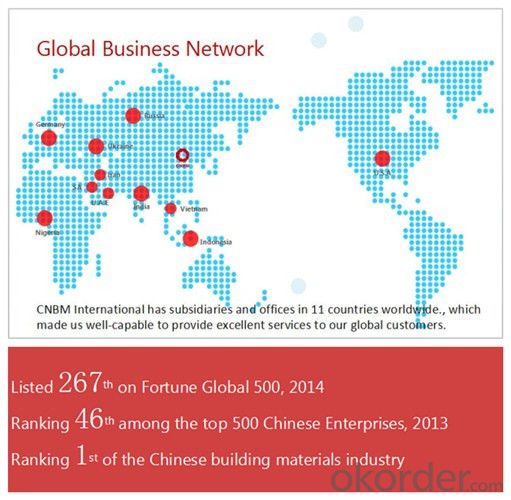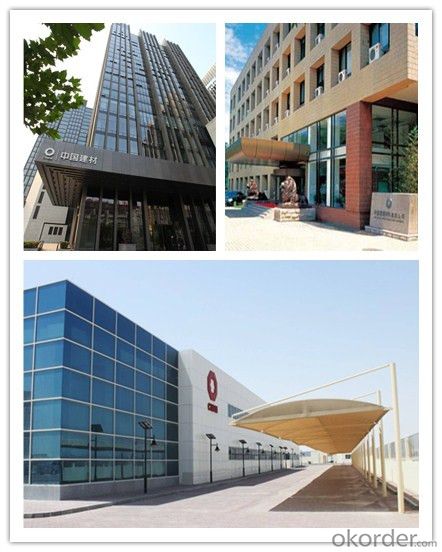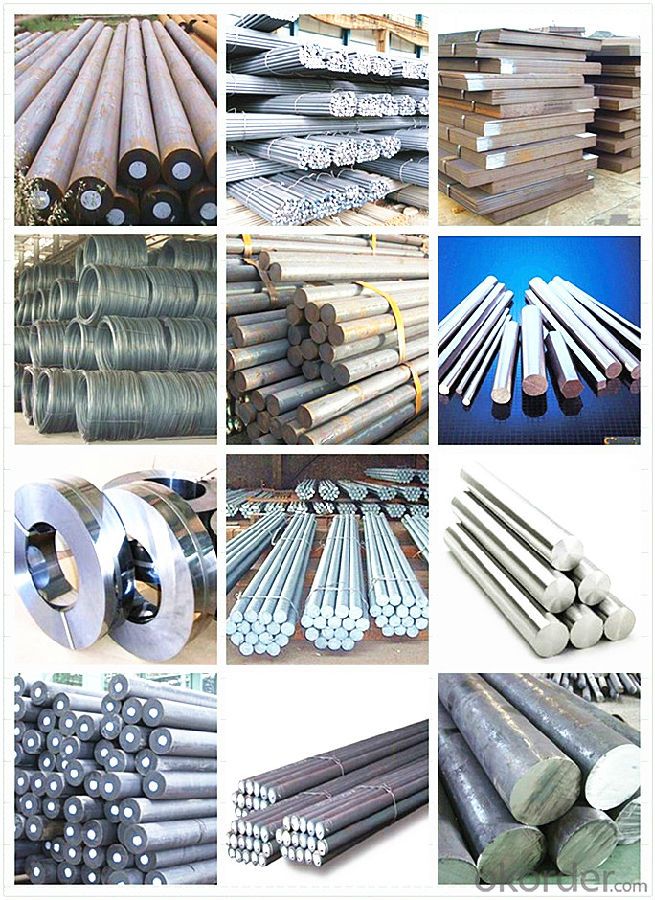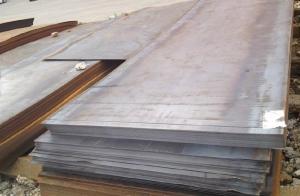Grade Q345/345B thickness 25mm Mild Steel Plate
- Loading Port:
- Tianjin
- Payment Terms:
- TT OR LC
- Min Order Qty:
- 3 m.t.
- Supply Capability:
- 100000 m.t./month
OKorder Service Pledge
OKorder Financial Service
You Might Also Like
Item specifice
Grade Q345/345B thickness 25mm Mild Steel Plate
Detailed Information of Grade Q345/345B thickness 25mm Mild Steel Plate
| C | Si | P | S | yield Strength MAp | Tensile strength MAp | Elongation % | ||
| A36 | 0.24 | 0.4 | 0.045 | 0.03 | 250 | 400-520 | 26 | |
| C | Si | Mn | P | S | Cu | |||
| A283 | ≤0.27 | 0.15-0.4 | ≤0.9 | ≤0.035 | ≤0.04 | ≥0.2 | ||
| Thickness: | 6mm, 8mm, 12mm, 16mm, 20mm, 25mm, 30mm, 50mm, 80mm, 100mm, 150mm, 200mm | |||||||
| Width: | 1500mm, 1800mm, 2000mm, 2200mm, 2500mm | |||||||
| Length: | 6000mm, 8000m, can cut to width and length | |||||||
| Packing Details; | according to customer‘s require or export’s standard | |||||||
| Delivery time; | 7 days for stock sizes, 20-25 days for new production sizes | |||||||
| Port: | Tianjin China | |||||||
Related Products Overviews of Grade Q345/345B thickness 25mm Mild Steel Plate
Product Name | Typical Grades | Diameter(mm) | Standard Adopted |
Carbon Steel | 20 (1020/S20C/C22) |
Ø16-Ø300 |
GB/SAE/ JIS/DIN |
40 (1040/S40C/C40) | |||
45 (1045/S45C/C45) | |||
Bearing Steel | GCr9 (51100/SUJ1) |
Ø12-Ø250 | |
GCr15 (52100/SUJ2/100Gr6) | |||
GCr9SiMn (A485-Gr.1/SUJ3) | |||
Cr-Mo Steel | 20Cr (5120/SCr420H/20Cr4) |
Ø12-Ø250 | |
40Cr (5140/SCr440/41Cr4) | |||
42CrMo(4140/SCM440/42CrMo4) | |||
Gear Steel | 20CrNiMo |
Ø16-Ø600 | |
20CrMn(5115/SMnC420/20MnCr5) | |||
20CrNiMo(8620/SNCM220/20CrMiMo2) |
Related Products Application of Grade Q345/345B thickness 25mm Mild Steel Plate
Carbon Steel | l Mold bottom l Plastic mold l Construction machinery parts l Automobile parts l Security grills l Screens l Construction |
Bearing Steel | l Aerospace l Navigation l Nuclear energy l Chemical industry l Electronic information l Petrochemical l Instrument and meter l Transportation |
Cr-Mo Steel | l Mechanism & Fasteners gear l Stressed components for vehicles l Engines and machines l Parts of larger cross-section |
Gear Steel | l All kinds of gears l Statically and dynamically stressed component for vehicles l Engines and machine l Larger cross-section parts l Crankshafts |
Company Introduction of Grade Q345/345B thickness 25mm Mild Steel Plate
CNBM International Corporation is the most import and export platform of CNBM group(China National Building Material Group Corporation) ,which is a state-owned enterprise, ranked in 270th of Fortune Global 500 in 2015.
With its advantages, CNBM International are mainly concentrate on Cement, Glass, Iron and Steel, Ceramics industries and devotes herself for supplying high quality series of refractories as well as technical consultancies and logistics solution.


After-sale service | l CNBM provides the services and support you need for every step of our cooperation. We’re the business partners you can trust; you can relax and get on with doing business. l For any problem, please kindly contact us at any your convenient time, we’ll reply you in our first priority within 24 hours
|
Advantages
| l Industry experience over 20 years. l Shipment of goods -More than 70 countries worldwide. l The most convenient transport and prompt delivery. l Competitive price with best service. l High technical production line with top quality products. l High reputation based on best quality products.
|
Packaging & Delivery of Grade Q345/345B thickness 25mm Mild Steel Plate
Packaging Detail | Sea worthy packing /as per customer's packing instruction |
Delivery Detail | 15 ~ 40 days after receiving the deposit |
Products Show

FAQ:
Are you a trading company or manufacturer? | Manufacturer |
What’s the MOQ? | 3 metric ton |
What’s your delivery time? | 15-35 days after downpayment received |
Do you Accept OEM service? | Yes |
what’s your delivery terms? | FOB/CFR/CIF |
What's the Payment Terms? | 30% as deposit,70% before shipment by T/T |
Western Union acceptable for small amount. | |
L/C acceptable for large amount. | |
Scrow ,Paybal,Alipay are also ok | |
Why choose us? | Chose happens because of quality, then price, We can give you both. Additionally, we can also offer professional products inquiry, products knowledge train (for agents), smooth goods delivery, excellent customer solution proposals. |
What's your available port of Shipment? | Main Port, China |
What’s your featured services? | Our service formula: good quality+ good price+ good service=customer's trust
|
Where are your Market? | Covering more than 160 countries in the world |
- Q:Can special steel be used in cryogenic applications?
- Yes, special steel can be used in cryogenic applications. Special steels, such as austenitic stainless steels like 304 or 316, are commonly used in cryogenic applications due to their excellent mechanical properties and resistance to low temperatures. These steels are able to maintain their strength, toughness, and ductility even at extremely low temperatures, making them suitable for use in cryogenic environments. Additionally, special steels can also exhibit good resistance to corrosion and thermal expansion, which are important factors to consider in cryogenic applications. Overall, special steel alloys are well-suited for use in cryogenic applications due to their unique combination of properties that enable them to withstand and perform in extremely cold conditions.
- Q:What are the main applications of special steel in the telecommunications sector?
- Special steel is commonly used in the telecommunications sector for various applications. One of the main uses of special steel in this industry is for the manufacturing of transmission towers and antenna structures. These steel structures provide the necessary support and stability for telecommunication equipment, ensuring reliable signal transmission. Additionally, special steel is also utilized in the production of cables and wires, which are crucial for transmitting data and electricity in telecommunication networks. The high strength and durability of special steel make it ideal for withstanding the harsh outdoor conditions that telecommunication infrastructure often faces.
- Q:What are the different construction grades of special steel?
- There are several different construction grades of special steel that are used in various industries and applications. These grades are specifically designed to provide superior strength, durability, and resistance to corrosion and other environmental factors. Some of the commonly known construction grades of special steel include: 1. Mild Steel: This is the most basic and widely used grade of special steel in construction. It has a low carbon content, making it easy to work with and weld. Mild steel is suitable for applications that require moderate strength and durability. 2. High-Strength Low-Alloy (HSLA) Steel: HSLA steel is a type of special steel that contains small amounts of alloying elements, such as copper, nickel, and vanadium. This grade offers higher strength and improved formability compared to mild steel. It is commonly used in structural applications where a higher strength-to-weight ratio is required. 3. Weathering Steel: Also known as Cor-Ten steel, weathering steel is a special grade that forms a protective layer of rust when exposed to the elements. This layer acts as a barrier against further corrosion, making it ideal for outdoor structures. Weathering steel is commonly used in bridges, buildings, and other architectural applications. 4. Stainless Steel: Stainless steel is a corrosion-resistant alloy that contains a minimum of 10.5% chromium. It offers excellent resistance to corrosion, heat, and chemicals, making it suitable for a wide range of construction applications. Stainless steel is commonly used in building facades, roofing, and structural components. 5. Tool Steel: Tool steel is a special grade that is specifically designed for making tools, dies, and molds. It has high hardness, wear resistance, and toughness properties, making it suitable for applications that require cutting, shaping, and forming of materials. 6. Alloy Steel: Alloy steel is a special grade that contains additional alloying elements, such as manganese, silicon, nickel, and chromium. This grade offers improved strength, toughness, and wear resistance compared to carbon steel. Alloy steel is commonly used in the construction of machinery, equipment, and components subjected to high stress and wear. These are just a few examples of the different construction grades of special steel. Each grade has its own unique properties and is chosen based on the specific requirements of the application.
- Q:What are the environmental considerations of using special steel?
- Special steel production has significant environmental considerations. The extraction and processing of raw materials, such as iron and coal, contribute to deforestation, habitat destruction, and greenhouse gas emissions. Moreover, the high energy requirements during steel production result in carbon dioxide emissions, contributing to climate change. Special steel also often requires the use of alloying elements, such as chromium and nickel, which can lead to toxic waste and pollution if not properly managed. Therefore, careful monitoring and implementation of sustainable practices are crucial to minimize the environmental impact associated with using special steel.
- Q:What are the different methods of surface passivation for special steel?
- Surface passivation methods for special steel vary in order to enhance its corrosion resistance and overall performance. One popular approach is chemical passivation, where a protective coating is applied to the steel's surface. This coating, composed of substances like chromium oxide or nitric acid, is typically formed through a chemical reaction that creates a protective layer. Chemical passivation is commonly used in industries where the steel is exposed to corrosive environments, such as marine or chemical applications. Another method is mechanical passivation, which involves physically altering the steel's surface to create a protective barrier. This can be achieved through techniques like shot peening or sandblasting, which create a roughened surface that is less prone to corrosion. Mechanical passivation is often employed in situations where the steel is exposed to abrasive or erosive conditions, such as mining or oil drilling. Electrochemical passivation is yet another technique used to passivate special steel surfaces. It entails using an electric current to generate a protective oxide layer on the steel's surface. Processes like electrochemical polishing or anodizing achieve this controlled oxidation. Electrochemical passivation is frequently utilized in industries where the steel is subjected to high temperatures or aggressive chemical environments. Additionally, specialized surface treatments, like plasma or laser surface passivation, are available for special steel. These methods utilize concentrated energy sources to modify the steel's surface and create a protective layer that enhances its corrosion resistance and mechanical properties. Such treatments are typically applied in high-performance applications, such as the aerospace or automotive industries. Ultimately, the choice of surface passivation method for special steel depends on the specific requirements of the application and the desired performance characteristics of the material. Each method has its own advantages and limitations, and factors like cost, time, and environmental impact should be considered when selecting the most suitable method for a particular application.
- Q:How does special steel perform in high-temperature mechanical applications?
- Special steel performs exceptionally well in high-temperature mechanical applications. Thanks to its unique composition and properties, such as high strength, excellent heat resistance, and thermal stability, special steel can withstand extreme temperatures without losing its structural integrity or mechanical properties. It exhibits minimal creep, oxidation, and deformation, ensuring reliable performance and durability in demanding high-temperature environments.
- Q:How does special steel contribute to the defense aftermarket industry?
- Special steel plays a crucial role in the defense aftermarket industry by providing high-quality materials that are essential for the production of various defense equipment and components. The unique properties of special steel, such as its exceptional strength, durability, and resistance to corrosion and extreme temperatures, make it a preferred choice for manufacturing military vehicles, aircraft, weapons, and other defense systems. One of the key ways in which special steel contributes to the defense aftermarket industry is through its use in armor and ballistic protection. Special steel alloys are utilized to create armor plates and panels that can withstand high-velocity impacts and protect military personnel and vehicles from enemy fire. These materials offer enhanced protection levels, reducing the risk of casualties and damage during combat. Moreover, special steel is also employed in the production of aerospace components. The defense industry heavily relies on aircraft for various operations, including reconnaissance, surveillance, and combat. Special steel alloys are used to manufacture critical components such as landing gear, engine parts, and structural elements, ensuring the safety, reliability, and performance of military aircraft. Furthermore, special steel's resistance to corrosion and extreme conditions makes it suitable for the construction of naval vessels and submarines. These naval assets operate in harsh marine environments, exposed to saltwater, extreme temperatures, and constant mechanical stress. Special steel alloys with high-strength properties and corrosion resistance are utilized in the construction of ship hulls, propeller shafts, and other critical components, ensuring longevity and operational effectiveness. In addition to its direct applications, special steel also contributes to the defense aftermarket industry through its role in the supply chain. The production of defense equipment and components often requires highly specialized machinery and tools, which are made from special steel. The availability of these materials is essential for maintaining a robust defense industry, enabling the efficient production and maintenance of defense systems. Overall, special steel plays a vital role in the defense aftermarket industry by providing the necessary materials for the production of high-performance, reliable, and durable defense equipment. Its unique properties contribute to the safety, effectiveness, and longevity of military vehicles, aircraft, weapons, and naval vessels, ultimately enhancing the capabilities of defense forces around the world.
- Q:How does special steel contribute to the automotive aftermarket industry?
- Special steel plays a significant role in the automotive aftermarket industry by offering various advantages that contribute to the overall performance, durability, and safety of vehicles. Firstly, special steel is known for its exceptional strength and durability. This property allows automotive manufacturers and aftermarket suppliers to develop high-performance components and parts that can withstand extreme conditions and heavy usage. Components such as engine parts, suspension systems, and chassis components benefit from the superior strength of special steel, ensuring their longevity and reliability. Additionally, special steel offers excellent corrosion resistance, which is crucial for automotive components exposed to various weather conditions and road environments. By using corrosion-resistant steel, aftermarket suppliers can produce parts that are less prone to rust and degradation, ultimately enhancing the lifespan of vehicles and reducing the need for frequent replacements. Furthermore, special steel enables the production of lightweight components without compromising on strength. With the increasing demand for fuel efficiency and reduced emissions, lightweight materials are highly sought after in the automotive industry. By utilizing special steel, aftermarket suppliers can create lightweight parts that contribute to improved fuel economy and overall performance of vehicles. Moreover, special steel's versatility allows for the development of complex and intricate components, contributing to advancements in vehicle technology. From precision-engineered gears and shafts to specialized parts for electric vehicles, special steel can be tailored to meet specific automotive requirements, supporting the industry's continuous innovation. Lastly, special steel offers cost-effectiveness in the automotive aftermarket industry. Although the initial cost of special steel might be higher than conventional steel, its durability and longevity result in reduced maintenance and replacement costs over time. This benefit is particularly significant for aftermarket suppliers and vehicle owners, as it helps minimize expenses and ensures a higher return on investment. In conclusion, special steel plays a vital role in the automotive aftermarket industry by providing strength, durability, corrosion resistance, lightweight properties, versatility, and cost-effectiveness. These qualities contribute to the overall performance, safety, and longevity of vehicles, making special steel a crucial material in the development of high-quality aftermarket components and parts.
- Q:How does the carbon content affect the properties of special steel?
- The carbon content in special steel plays a crucial role in determining its properties. The addition of carbon to steel alters its microstructure and influences various mechanical and physical properties. The primary effect of carbon content is on the hardness and strength of the steel. Increasing the carbon content in special steel leads to an increase in its hardness. This is because carbon atoms occupy the interstitial sites in the iron lattice, which creates a distortion in the crystal structure, making it more resistant to deformation. Higher carbon content also results in a greater martensitic transformation during heat treatment, which further enhances the hardness of the material. Furthermore, the strength of special steel is significantly influenced by carbon content. Higher carbon levels lead to increased strength due to the formation of stronger and more numerous carbide precipitates. These carbides act as obstacles to dislocation movement, making it more difficult for the steel to deform under load. However, it is important to note that the increase in carbon content also comes with some trade-offs. As the carbon content rises, the ductility of the steel decreases. This means that the material becomes less able to deform without fracturing. High carbon content can make the steel brittle, reducing its toughness and impact resistance. In addition to hardness and strength, carbon content affects other properties of special steel. It influences the steel's wear resistance, as higher carbon content leads to the formation of harder carbides that can resist wear and abrasion. Carbon also affects the steel's machinability, with higher carbon content making the material more difficult to machine due to increased hardness. In conclusion, the carbon content has a significant impact on the properties of special steel. It affects the hardness, strength, ductility, toughness, wear resistance, and machinability of the material. Therefore, careful consideration of the desired properties and application requirements is necessary when determining the appropriate carbon content for special steel.
- Q:Are there any international standards for special steel?
- Yes, there are international standards for special steel. The most widely recognized and accepted international standards for special steel are set by the International Organization for Standardization (ISO). ISO develops and publishes a range of standards that cover various aspects of special steel, including composition, properties, testing methods, and quality requirements. These standards ensure that special steel produced by different manufacturers from different countries meet the same minimum quality and performance criteria. In addition to ISO, there are also other organizations and standards bodies that have their own specific standards for special steel, such as the American Society for Testing and Materials (ASTM) and the European Committee for Iron and Steel Standardization (ECISS). These international standards provide a common framework for the production, trade, and use of special steel across different countries and industries, promoting consistency, reliability, and quality assurance.
1. Manufacturer Overview |
|
|---|---|
| Location | |
| Year Established | |
| Annual Output Value | |
| Main Markets | |
| Company Certifications | |
2. Manufacturer Certificates |
|
|---|---|
| a) Certification Name | |
| Range | |
| Reference | |
| Validity Period | |
3. Manufacturer Capability |
|
|---|---|
| a)Trade Capacity | |
| Nearest Port | |
| Export Percentage | |
| No.of Employees in Trade Department | |
| Language Spoken: | |
| b)Factory Information | |
| Factory Size: | |
| No. of Production Lines | |
| Contract Manufacturing | |
| Product Price Range | |
Send your message to us
Grade Q345/345B thickness 25mm Mild Steel Plate
- Loading Port:
- Tianjin
- Payment Terms:
- TT OR LC
- Min Order Qty:
- 3 m.t.
- Supply Capability:
- 100000 m.t./month
OKorder Service Pledge
OKorder Financial Service
Similar products
New products
Hot products
Related keywords

































